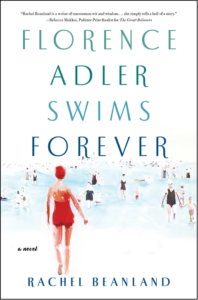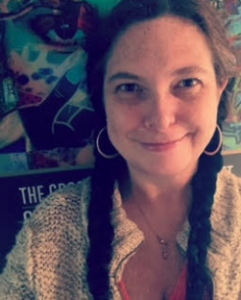 Fierce Sonia is a mixed media artist. She builds layers with acrylic paint and collage. A narrative is constructed by the tension between the lush layers moving to dreamy feminine mindscapes with a brighter palette. If you listen closely her work has a soundtrack, a rhythm, a pulse that will give you a magic carpet ride to a fairytale that restates your own heartbeat. Fierce Sonia can be found at https://fiercesonia.squarespace.com/, https://www.facebook.com/fiercesonia,
Fierce Sonia is a mixed media artist. She builds layers with acrylic paint and collage. A narrative is constructed by the tension between the lush layers moving to dreamy feminine mindscapes with a brighter palette. If you listen closely her work has a soundtrack, a rhythm, a pulse that will give you a magic carpet ride to a fairytale that restates your own heartbeat. Fierce Sonia can be found at https://fiercesonia.squarespace.com/, https://www.facebook.com/fiercesonia,
and https://www.patreon.com/Fiercesonia.
The cover art “Equinox Queen” was inspired by the stillness and quiet that came with our first real snow storm in my new wild and wonderful home of West Virginia. I love the creativity that can be unleashed in these hours of stillness. This piece begins the story of seasonal changes and the beautiful complexity of nature.
 T.J. Butler lives on a sailboat on Maryland’s Chesapeake Bay with her husband and dog. She writes fiction and essays that are not all fun and games. Her work appears or is forthcoming in Pembroke, Levee, Flash Fiction Online, Tahoma Literary Review, New South, and others. Her collection of short stories, “A Flame on the Ocean” is forthcoming from Adelaide Books. T.J. Butler can be found at https://tjbutlerauthor.com/ and on Twitter.
T.J. Butler lives on a sailboat on Maryland’s Chesapeake Bay with her husband and dog. She writes fiction and essays that are not all fun and games. Her work appears or is forthcoming in Pembroke, Levee, Flash Fiction Online, Tahoma Literary Review, New South, and others. Her collection of short stories, “A Flame on the Ocean” is forthcoming from Adelaide Books. T.J. Butler can be found at https://tjbutlerauthor.com/ and on Twitter.
The inspiration for A Stalled Line at CVS, 9 p.m.: I was at CVS a few months before COVID, and I was struck by how perfectly outlined my life was on the perfume shelf behind the counter.
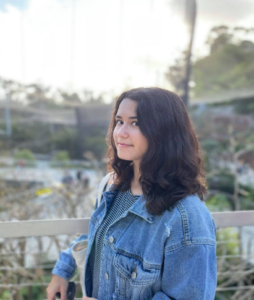 Ariella Carmell is a writer living in Southern California. She graduated from the University of Chicago, where she was the recipient of the Olga and Paul Menn Prize for Playwriting. Her writing can be found in Alma, the Brooklyn Review, Maudlin House, Spry, Bare Fiction, and Literary Orphans, among others. She was a 2015 and 2016 winner of the Blank Theatre Young Playwrights Festival and the 2019 Michael Collyer Memorial Fellow in Screenwriting, awarded by the Writers Guild of America, East. To paraphrase Joan Didion, she writes entirely to find out what she’s thinking.
Ariella Carmell is a writer living in Southern California. She graduated from the University of Chicago, where she was the recipient of the Olga and Paul Menn Prize for Playwriting. Her writing can be found in Alma, the Brooklyn Review, Maudlin House, Spry, Bare Fiction, and Literary Orphans, among others. She was a 2015 and 2016 winner of the Blank Theatre Young Playwrights Festival and the 2019 Michael Collyer Memorial Fellow in Screenwriting, awarded by the Writers Guild of America, East. To paraphrase Joan Didion, she writes entirely to find out what she’s thinking.
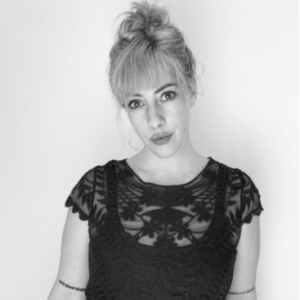 Leanne Drapeau (she/her) is a teacher and writer from Connecticut. She is a Pushcart Prize nominee and an MFA candidate at Randolph College in Virginia. She has poetry in B O D Y Literature and forthcoming from The American Journal of Poetry. You can find her on Twitter @DrapeauLeanne.
Leanne Drapeau (she/her) is a teacher and writer from Connecticut. She is a Pushcart Prize nominee and an MFA candidate at Randolph College in Virginia. She has poetry in B O D Y Literature and forthcoming from The American Journal of Poetry. You can find her on Twitter @DrapeauLeanne.
The inspiration for On Making Love to, and Breakfast for, My Rapist. On Keeping His Lighter.: I thought I was writing this essay (which I call “the lighter essay” in my head because the actual title is long and triggering) to answer lingering questions. It turns out I was writing it to forgive myself and to heal. I hope others find healing in it as well.
Faith Ellington is a PhD student at Louisiana State University, where she lives and writes.
Annie Fan reads law at Oxford University, where they were president of the poetry society. Their poetry appears or will appear in Puerto Del Sol, The Offing, Ambit, and PN Review, among others. They are currently working on a commission in response to the COVID-19 pandemic for the Barbican Centre in London, and their pamphlet “Woundsong” is forthcoming from Verve
Press in May 2021. When not writing or studying for exams they can be found trying to recreate viral pasta recipes, buying too many earrings, and basking in the sun. You can find them tweeting at @gnomic_aorist.
The inspiration for Triple Sonnet to Surviving White Men on Tinder: The dating scene at Oxford is, quite simply, terrible and terrifying!
Steve Gehrke has published three books of poetry, most recently Michelangelo’s Seizure, which was selected for the National Poetry Series. His awards include an NEA, a Pushcart, and a Lannan Literary Residency. He teaches at the University of Nevada-Reno.
 Mara Lee Grayson is a writer and race rhetorics scholar originally from Brooklyn, New York. Her poems and stories have appeared or are forthcoming in Mobius, Fiction, Columbia Journal, Poetry Northwest, and elsewhere. Her poems have been nominated for the Pushcart Prize and shortlisted for the Slippery Elm Prize. Grayson is the author of two books of scholarship and is
Mara Lee Grayson is a writer and race rhetorics scholar originally from Brooklyn, New York. Her poems and stories have appeared or are forthcoming in Mobius, Fiction, Columbia Journal, Poetry Northwest, and elsewhere. Her poems have been nominated for the Pushcart Prize and shortlisted for the Slippery Elm Prize. Grayson is the author of two books of scholarship and is
an assistant professor of composition and rhetoric at California State University, Dominguez Hills. She currently resides in Southern California. Mara Lee Grayson can be found at maragrayson.com or on Twitter. You can read more of her work at http://mobiusmagazine.com/poetry/34years.html.
The inspiration for this work: A friend recommended I watch old episode of Forensic Files; these poems are the result of that Netflix binge.
Rhienna Renée Guedry is a queer writer and artist who found her way to the Pacific Northwest, perhaps solely to get use of her vintage outerwear collection. Her work has been featured in Empty Mirror, HAD, Oyster River Pages, Bitch Magazine, Screen Door, and elsewhere. Rhienna is currently working on her first novel. Find more about her projects at rhienna.com or @cajunsparkle_ on Twitter.
The inspiration for Time For Small Animals: This poem was inspired by learning that small animals experience their world in slow motion, due to their metabolic rates and body mass.
Junmoke James is a student at Lehigh University. She hails from Marietta, GA and in her free time enjoys playing tennis and online shopping.
Emily Karl has been published in Amsterdam Quarterly and ZYZZYVA. She holds a B.A. from Middlebury College, an MLIS from San Jose State University, and an M.A. from San Francisco State University. Emily is originally from New England and has lived in California since 1989.
 Christen Noel Kauffman lives in Richmond, Indiana with her husband and two daughters. Her hybrid chapbook “Notes to a Mother God” (forthcoming, 2021) was a winner of the Paper Nautilus Debut Chapbook Series. Her essays, poems, and stories can be found in A Harp in the Stars: An Anthology of Lyric Essays (forthcoming, University of Nebraska Press), Tupelo Quarterly, The Cincinnati Review, Willow Springs, DIAGRAM, Booth, Smokelong Quarterly, Hobart, and The Normal School, among others. She can be found at christennoelkauffman.com or on Twitter.
Christen Noel Kauffman lives in Richmond, Indiana with her husband and two daughters. Her hybrid chapbook “Notes to a Mother God” (forthcoming, 2021) was a winner of the Paper Nautilus Debut Chapbook Series. Her essays, poems, and stories can be found in A Harp in the Stars: An Anthology of Lyric Essays (forthcoming, University of Nebraska Press), Tupelo Quarterly, The Cincinnati Review, Willow Springs, DIAGRAM, Booth, Smokelong Quarterly, Hobart, and The Normal School, among others. She can be found at christennoelkauffman.com or on Twitter.
Barbara Lawhorn is an Assistant Professor at Western Illinois University. She’s into literacy activism, walking her dog, Banjo, running, baking and eating pie, and finding the wild places, within herself and outside in the world. Her most recent work can be found at Poetry South, Flash Fiction Magazine, High Shelf Poetry, and White Wall Review. She lives and writes joyfully in the Midwest with her favorite creative endeavors, sons, Mars and Jack.
The inspiration for Underground Volcanoes was born out of my youngest son telling me about finding a dead cat on his way to the skatepark, how deeply sad he was, and how supportive his skateboarding crew was.
Cassie Leone is originally from the Bay Area, California. She completed her BA at Smith College and her MFA at UC Irvine (expected May 2021). Her work can be found in The Roadrunner Review, Foothill Journal, Salt Hill Journal, and others. She is the co-editor and co- founder of Thuya Poetry Review. She’s been awarded the Lynn Garnier Memorial Award for poetry, the Nora Folkenflik Award for Excellence in Poetry, and the Academy of American Poets Prize. She currently resides in San Diego, California with her pet rabbits.
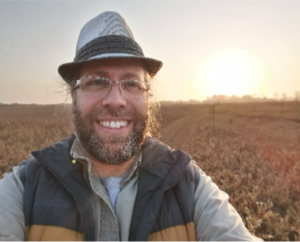 D.A. Lockhart is the author of seven collections of poetry, including Devil in the Woods (Brick Books 2019) and Tukhone: Where the River Narrows and the Shores Bend (Black Moss Press 2020). He is a Turtle Clan member of Eelünaapéewi Lahkéewiit (Lenape), and currently resides at the south shore of Waawiiyaatanong (Windsor, ON-Detroit, MI) and Pelee Island. His work has been generously supported by the Ontario Arts Council and the Canada Council for the Arts. He is the publisher at Urban Farmhouse Press and poetry editor for the Windsor Review. You can find D.A. Lockhart at www.wazhashkpoetry.com, on Twitter, or on Instagram.
D.A. Lockhart is the author of seven collections of poetry, including Devil in the Woods (Brick Books 2019) and Tukhone: Where the River Narrows and the Shores Bend (Black Moss Press 2020). He is a Turtle Clan member of Eelünaapéewi Lahkéewiit (Lenape), and currently resides at the south shore of Waawiiyaatanong (Windsor, ON-Detroit, MI) and Pelee Island. His work has been generously supported by the Ontario Arts Council and the Canada Council for the Arts. He is the publisher at Urban Farmhouse Press and poetry editor for the Windsor Review. You can find D.A. Lockhart at www.wazhashkpoetry.com, on Twitter, or on Instagram.
Aimee Lowenstern is a twenty-two-year-old poet living in Nevada. She has cerebral palsy and is fond of glitter. Her work can be found in several literary journals, including Soliloquies Anthology and The Gateway Review.
 T.S. McAdams lives in the San Fernando Valley and has plastic grass for reasons. His fiction has appeared in Beneath Ceaseless Skies, Santa Monica Review, Pembroke, Faultline, Lady Churchill’s Rosebud Wristlet, MonkeyBicycle, and other fine periodicals near you. You can find T.S. McAdams on Twitter.
T.S. McAdams lives in the San Fernando Valley and has plastic grass for reasons. His fiction has appeared in Beneath Ceaseless Skies, Santa Monica Review, Pembroke, Faultline, Lady Churchill’s Rosebud Wristlet, MonkeyBicycle, and other fine periodicals near you. You can find T.S. McAdams on Twitter.
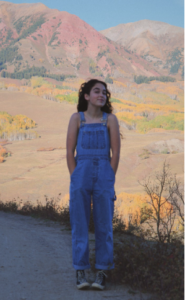 Californian Maya Savin Miller graduates high school in 2021. Maya’s prose and poetry have appeared in Cleaver, Cargoes, Up North, Hadassah, Battering Ram, Polyphony, Bluefire, Skipping Stones, and jGirls Magazine with new work forthcoming in One Magazine. Her writing has been recognized by Princeton, Hollins, Columbia, Rider, Scholastic, Library of Congress, Skipping Stones, Blank Theatre National Playwrights Festival, and Leyla Beban Foundation. She was a 2020 finalist for Los Angeles Youth Poet Laureate. And her story, “Trudie’s Goose,” adapted to film by Israeli filmmaker, Liran Kapel, was an Official Selection of Cannes and a finalist in its Emerging Filmmaker Showcase.
Californian Maya Savin Miller graduates high school in 2021. Maya’s prose and poetry have appeared in Cleaver, Cargoes, Up North, Hadassah, Battering Ram, Polyphony, Bluefire, Skipping Stones, and jGirls Magazine with new work forthcoming in One Magazine. Her writing has been recognized by Princeton, Hollins, Columbia, Rider, Scholastic, Library of Congress, Skipping Stones, Blank Theatre National Playwrights Festival, and Leyla Beban Foundation. She was a 2020 finalist for Los Angeles Youth Poet Laureate. And her story, “Trudie’s Goose,” adapted to film by Israeli filmmaker, Liran Kapel, was an Official Selection of Cannes and a finalist in its Emerging Filmmaker Showcase.
The inspiration for this work: Here Lie Our Bones, like most of my writing, is informed by the web of my life experience and, moreover, by my own attempts to process those experiences.
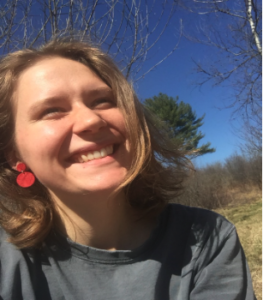 Claire Nicholson (she/her) currently lives in Maine, where she was born. She is a graduate of Hamilton College in Clinton, New York and enjoys plants, bagels, and ultimate frisbee. Nicholson has previously been published in Gone Lawn and Modern Poetry Quarterly Review. You can find Claire Nicholson on Twitter, or at http://journal.gonelawn.net/issue38/Nicholson.php and http://www.modernpoetryreview.com/poetry/two-poems-by-claire-nicholson/.
Claire Nicholson (she/her) currently lives in Maine, where she was born. She is a graduate of Hamilton College in Clinton, New York and enjoys plants, bagels, and ultimate frisbee. Nicholson has previously been published in Gone Lawn and Modern Poetry Quarterly Review. You can find Claire Nicholson on Twitter, or at http://journal.gonelawn.net/issue38/Nicholson.php and http://www.modernpoetryreview.com/poetry/two-poems-by-claire-nicholson/.
The inspiration for this work: I wrote Girl in the Mirror to investigate how my conception of self is influenced and distorted by others around me and my awareness of their perception.
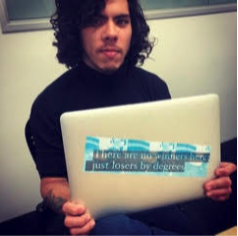 Sean Nishi is a writer from Los Angeles, CA. He completed his MFA in creative writing at California College of the Arts in San Francisco. His work has appeared in STORGY, Poydras Review, TIMBER, Tatterhood Review, and Streetlight. He lives with his partner and two cats, Toby and Waffles. You can find Sean Nishi on Instagram or read more at https://storgy.com/2020/12/28/christmas-is-a-sad-season-for-everyone-by-sean-nishi/ and https://timberjournal.org/archive/squish-me.
Sean Nishi is a writer from Los Angeles, CA. He completed his MFA in creative writing at California College of the Arts in San Francisco. His work has appeared in STORGY, Poydras Review, TIMBER, Tatterhood Review, and Streetlight. He lives with his partner and two cats, Toby and Waffles. You can find Sean Nishi on Instagram or read more at https://storgy.com/2020/12/28/christmas-is-a-sad-season-for-everyone-by-sean-nishi/ and https://timberjournal.org/archive/squish-me.
Ernest O. Ògúnyẹmí is a writer and editor from Nigeria. His works have appeared/ are forthcoming in AGNI, Joyland, No Tokens, Agbowó, Southern Humanities Review, the McNeese Review, among others. He is a staff writer at Open Country Mag.
The inspiration for this work: The poem Grief Season came to me on a cold night while I was out smoking. In the distance, automobiles shined their lights, “burning arts parade”—and then my grief finds expression.
In the unbecoming, I wanted to capture what it was like the day my mother died, how they washed her body and wrapped her up and gave her to the earth.
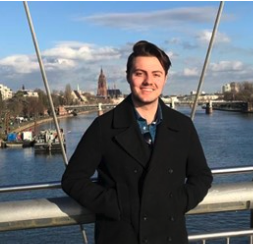 Brevin Persike has worked shifts at factories, scrubbed oil out of concrete floors, painted walls later to be destroyed and flipped three-dollar burgers at a fast-food joint, but none of that has struck his fancy. His writing derives much of its inspiration from the woods of northern Wisconsin where he grew up, and the slow-moving life along the Mississippi River that he grew accustomed to during his undergrad. Now he finds himself in locked-down Edinburgh, wandering through parks and empty streets. His work can be found in From Arthur’s Seat and the Catalyst.
Brevin Persike has worked shifts at factories, scrubbed oil out of concrete floors, painted walls later to be destroyed and flipped three-dollar burgers at a fast-food joint, but none of that has struck his fancy. His writing derives much of its inspiration from the woods of northern Wisconsin where he grew up, and the slow-moving life along the Mississippi River that he grew accustomed to during his undergrad. Now he finds himself in locked-down Edinburgh, wandering through parks and empty streets. His work can be found in From Arthur’s Seat and the Catalyst.
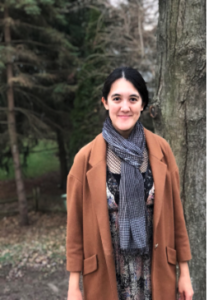 Miyako Pleines is a Japanese and German American writer living in the suburbs of Chicago. She holds an MFA in creative writing from Northwestern University, and her work has appeared on the Ploughshares blog, Hypertext Review, Hapa Mag, and is forthcoming from The Rumpus, Electric Literature, and others. She writes a column about birds and books for the Chicago Audubon Society, and you can follow her on Instagram @literary_miyako. Links to her work can be found on her website, miyakowrites.com.
Miyako Pleines is a Japanese and German American writer living in the suburbs of Chicago. She holds an MFA in creative writing from Northwestern University, and her work has appeared on the Ploughshares blog, Hypertext Review, Hapa Mag, and is forthcoming from The Rumpus, Electric Literature, and others. She writes a column about birds and books for the Chicago Audubon Society, and you can follow her on Instagram @literary_miyako. Links to her work can be found on her website, miyakowrites.com.
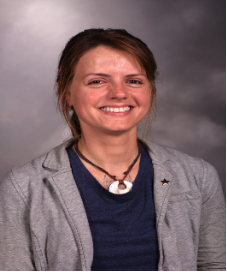 Kacie Prologo is a Rust Belt writer who has spent her life wrapped up in the kinds of familial mythology that runs rampant in her hometown of Alliance, Ohio. As a student in the Northeast Ohio Master of Fine Arts Creative Writing program, Kacie spends her time translating this family folklore into both fiction and nonfiction. Her work has been featured in The DillyDoun Review, Fearsome Critters, The Finger Literary Journal, and Weasel Press. You can see more from Kacie Prologo at https://thedillydounreview.com/kacie-prologo/, https://issuu.com/fearsomecritters/docs/v3_issuu, and http://thefingermag.com/2021/01/1723/.
Kacie Prologo is a Rust Belt writer who has spent her life wrapped up in the kinds of familial mythology that runs rampant in her hometown of Alliance, Ohio. As a student in the Northeast Ohio Master of Fine Arts Creative Writing program, Kacie spends her time translating this family folklore into both fiction and nonfiction. Her work has been featured in The DillyDoun Review, Fearsome Critters, The Finger Literary Journal, and Weasel Press. You can see more from Kacie Prologo at https://thedillydounreview.com/kacie-prologo/, https://issuu.com/fearsomecritters/docs/v3_issuu, and http://thefingermag.com/2021/01/1723/.
The inspiration for Grease Guzzlers came from some of my own experiences working with my town’s state liquor agency.
 Chuck Radke‘s memoir, Stuccoville: Life Without a Net (WiDo), came out in January, 2021. His creative nonfiction is forthcoming or has appeared in The Showbear Family Circus, Palante, HASH Literary Journal, and Montana Mouthful. His short fiction has appeared in Mud Season Review, The San Joaquin Review, Hayden’s Ferry Review, Gulf Stream Magazine, and The South Dakota Review. He is the recipient of an AWP Intro Award for fiction and the Estelle Campbell Prize for literature from the National Society of Arts and Letters.
Chuck Radke‘s memoir, Stuccoville: Life Without a Net (WiDo), came out in January, 2021. His creative nonfiction is forthcoming or has appeared in The Showbear Family Circus, Palante, HASH Literary Journal, and Montana Mouthful. His short fiction has appeared in Mud Season Review, The San Joaquin Review, Hayden’s Ferry Review, Gulf Stream Magazine, and The South Dakota Review. He is the recipient of an AWP Intro Award for fiction and the Estelle Campbell Prize for literature from the National Society of Arts and Letters.
Chuck works and writes in Fresno, California.
You can find Chuck Radke at https://charleslewisradke.com, https://www.facebook.com/charleslewisradke, and on Instagram.
The inspiration for this work: With a nod to Robert Olen Butler’s short story, “Jealous Husband Returns in Form of Parrot,” it was persistent jaw pain, manifested as an inability to eat and speak well, that inspired me to write Pretty Bird.
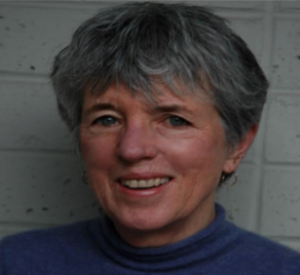 Claire Scott is an award-winning poet who has received multiple Pushcart Prize nominations. Her work has appeared in the Atlanta Review, Bellevue Literary Review, New Ohio Review, Enizagam, and The Healing Muse among others. Claire is the author of Waiting to be Called and Until I Couldn’t. She is the co-author of Unfolding in Light: A Sisters’ Journey in Photography and Poetry.
Claire Scott is an award-winning poet who has received multiple Pushcart Prize nominations. Her work has appeared in the Atlanta Review, Bellevue Literary Review, New Ohio Review, Enizagam, and The Healing Muse among others. Claire is the author of Waiting to be Called and Until I Couldn’t. She is the co-author of Unfolding in Light: A Sisters’ Journey in Photography and Poetry.
 Aarron Sholar‘s piece In the Event That the Wildfire is Heading Your Way and Cannot be Stopped was inspired by his reflections on surgical experiences as a young, transgender man. He has had pieces published in 45th Parallel Literary Magazine, Polaris Magazine, and Scarab Magazine. He pursued his undergrad at Salisbury University, MD and newly resides in Mankato, MN.
Aarron Sholar‘s piece In the Event That the Wildfire is Heading Your Way and Cannot be Stopped was inspired by his reflections on surgical experiences as a young, transgender man. He has had pieces published in 45th Parallel Literary Magazine, Polaris Magazine, and Scarab Magazine. He pursued his undergrad at Salisbury University, MD and newly resides in Mankato, MN.
 Dorsía Smith Silva is a Pushcart Prize nominee, Obsidian Fellow, and Professor of English at the University of Puerto Rico, Río Piedras. Her poetry has been published or is forthcoming in Poetry Northwest, Superstition Review, Porter House Review, Portland Review, Pidgeonholes, SAND, and elsewhere. She is also the author of Good Girl (micro-chapbook), editor of Latina/Chicana Mothering, and the co-editor of six books. She has a Ph.D. in Caribbean Literature and Language. Her website is dorsiasmithsilva.com and you can find her on Twitter and Instagram.
Dorsía Smith Silva is a Pushcart Prize nominee, Obsidian Fellow, and Professor of English at the University of Puerto Rico, Río Piedras. Her poetry has been published or is forthcoming in Poetry Northwest, Superstition Review, Porter House Review, Portland Review, Pidgeonholes, SAND, and elsewhere. She is also the author of Good Girl (micro-chapbook), editor of Latina/Chicana Mothering, and the co-editor of six books. She has a Ph.D. in Caribbean Literature and Language. Her website is dorsiasmithsilva.com and you can find her on Twitter and Instagram.
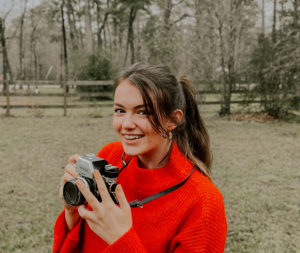 Sarah Swinford was raised somewhere between a small town in Northern Germany and the suburbs of Houston, Texas. She first began writing and performing her poems at a German poetry slam club and was previously an associate poetry editor for Glass Mountain Magazine. Sarah has a BA in English from the University of Houston and is currently pursuing her M.Ed. at the University of Houston – Victoria. She is writing from Magnolia, Texas. Read more here or find her on Instagram.
Sarah Swinford was raised somewhere between a small town in Northern Germany and the suburbs of Houston, Texas. She first began writing and performing her poems at a German poetry slam club and was previously an associate poetry editor for Glass Mountain Magazine. Sarah has a BA in English from the University of Houston and is currently pursuing her M.Ed. at the University of Houston – Victoria. She is writing from Magnolia, Texas. Read more here or find her on Instagram.
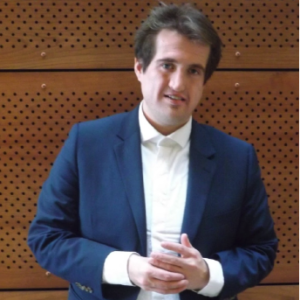 Carter Vance is a writer and poet originally from Cobourg, Ontario, Canada currently resident in Gatineau, Quebec, Canada. His work has appeared in such publications as The Smart Set, Contemporary Verse 2, and A Midwestern Review, amongst others. He was previously a Harrison Middleton University Ideas Fellow. His latest collection of poems, Places to Be, is currently available from Moonstone Arts Press.
Carter Vance is a writer and poet originally from Cobourg, Ontario, Canada currently resident in Gatineau, Quebec, Canada. His work has appeared in such publications as The Smart Set, Contemporary Verse 2, and A Midwestern Review, amongst others. He was previously a Harrison Middleton University Ideas Fellow. His latest collection of poems, Places to Be, is currently available from Moonstone Arts Press.
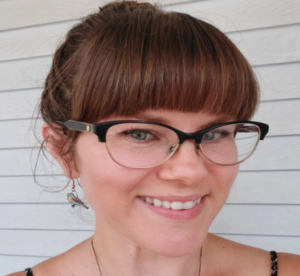 Jacqueline Vogtman received her MFA in Fiction from Bowling Green State University, and her work has appeared in Atticus Review, Connotation Press, Copper Nickel, Emerson Review, Gargoyle Magazine, Mud Season Review, The Literary Review, Versal, and other journals. She teaches English Composition and Literature at Mercer County Community College, where she is Editor of the Kelsey Review and co-advises the student creative writing club, SOUL. She lives in New Jersey with her husband, daughter, and dog.
Jacqueline Vogtman received her MFA in Fiction from Bowling Green State University, and her work has appeared in Atticus Review, Connotation Press, Copper Nickel, Emerson Review, Gargoyle Magazine, Mud Season Review, The Literary Review, Versal, and other journals. She teaches English Composition and Literature at Mercer County Community College, where she is Editor of the Kelsey Review and co-advises the student creative writing club, SOUL. She lives in New Jersey with her husband, daughter, and dog.
Wilder Family was inspired by the deer that populate our semi-rural corner of New Jersey, and, sadly, by two deer I’ve hit with my car, the first right around the time I found out I was pregnant with my daughter, and the second more recently, as my daughter is beginning to grow up and away from me.
Elise Wallace is pursuing an MFA in nonfiction at the University of New Hampshire. Her writing is inspired by coffee-shop anecdotes provided by years working as a barista, her Appalachian Trail thru-hike, life experiences rooted in emotional memory, and the tenuous division of truth and fiction. In addition to studying the essay, she explores overheard phrases through her project Found Aloud. For her hiking blog she records conversations with hikers and incorporates their stories into her writing. She is writing from New Hampshire but will always call North Carolina home. She can be found at elise-wallace.com.
Adam D. Weeks is an undergraduate student at Salisbury University in Salisbury, Maryland, the social media manager for The Shore and a poetry reader for Quarterly West. He is a Pushcart Prize nominee and has poetry published or forthcoming in Ninth Letter, Poet Lore, Sugar House Review, Puerto del Sol, Sycamore Review, and elsewhere.
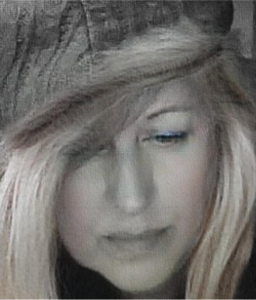 Chila Woychik is originally from the beautiful land of Bavaria but has lived in the American Midwest for many years. She has been published in Cimarron, Passages North, and others, and has an essay collection, Singing the Land: A Rural Chronology (Shanti Arts, 2020). She won Storm Cellar‘s 2019 Flash Majeure Contest, Emry Journal‘s 2016 Linda Julian Creative Nonfiction Award, and double-finaled in the 2019 Barry Lopez Creative Nonfiction Contest (Cutthroat). She currently tends a small farmstead and continues to be enamored with the concept of time. She edits the Eastern Iowa Review. You can find her at www.chilawoychik.com.
Chila Woychik is originally from the beautiful land of Bavaria but has lived in the American Midwest for many years. She has been published in Cimarron, Passages North, and others, and has an essay collection, Singing the Land: A Rural Chronology (Shanti Arts, 2020). She won Storm Cellar‘s 2019 Flash Majeure Contest, Emry Journal‘s 2016 Linda Julian Creative Nonfiction Award, and double-finaled in the 2019 Barry Lopez Creative Nonfiction Contest (Cutthroat). She currently tends a small farmstead and continues to be enamored with the concept of time. She edits the Eastern Iowa Review. You can find her at www.chilawoychik.com.
Her essay A Clock Tower Keeps Its Seconds Even When the Bells Forget to Ring reflects the truth that time progression is something we can’t control, and she is rather fixated on that idea.

